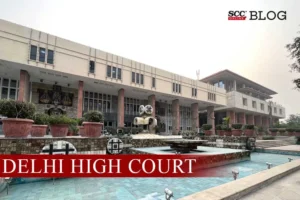Delhi High Court: In an appeal filed under Section 19(3) of Family Courts Act, 1984 and Section 28 of Hindu Marriage Act, 1955 (‘the Act’) against the Family Court order dated 06-04-2023 whereby pendente lite maintenance of the appellant-wife was declined and respondent-husband was directed to pay Rs. 20,000 per month for maintenance of the minor child, the Division Bench of V. Kameswar Rao and Anoop Kumar Mendiratta*, JJ., modified the impugned order and opined that the wife was entitled to maintenance of Rs. 15,000 per month apart from the maintenance amount of child, i.e., Rs. 20,000.
Background:
In the instant case, marriage between the parties was solemnized on 02-09-2000 and a girl child was born from the wedlock on 10-12-2010. The wife alleged that the husband treated her with cruelty, deserted her, and constrained her to live separately since December 2013 and thus, she filed a petition for dissolution of marriage under Sections 13(ia) and (ib) of the Act. The wife also filed an application for interim maintenance under Section 24 of the Act claiming Rs. 75,000 per month for herself and her minor daughter. The husband agreed to give divorce to the wife on mutual consent. Thereafter the husband remained absent and thus, the husband was proceeded ex parte.
The wife held a degree in LLB, MBA and was professionally qualified in Gems and Gemology. She owned a business named IDT Laboratory with a part-time work. The net worth of the business was disclosed as Rs. 15 lakhs with a gross profit of Rs. 4 lakhs per annum. The wife also claimed rental income of Rs. 15,000 and apart from above-mentioned incomes, she held four FDRs amounting to Rs. 4,26,021 approximately. Further, the wife claimed a monthly expenditure of Rs. 1,18,633 including Rs. 36,606 for her child’s education, stationery, and entertainment. Also, the wife filed an affidavit where the husband’s monthly income was claimed to be at least Rs. 2 lakhs.
The husband was proceeded ex-parte and the Judge, Family Court passed a decree for divorce but denied maintenance pendente lite and held that the wife was capable of maintaining herself. Further, the husband’s income, who was a practicing advocate was assessed by the Family Court to be not less than Rs. 1 lakh per month and considering Rs. 36,066 to be the monthly expenditure of child who was joint liability of both parties, the husband was directed to pay Rs. 20,000 per month towards maintenance of the minor child. The wife was granted litigation expenses of Rs. 11,000.
Decision
The Court relied on Rajnesh v. Neha, (2021) 2 SCC 324 and opined that that there was no straitjacket mechanism for fixing the quantum of maintenance and relevant factors for deciding it were the status of the parties, reasonable needs of the wife and dependent children, whether the wife was educated and professionally qualified, whether the wife had any independent source of income, whether the income was sufficient to enable her to maintain the same standard of living as she was accustomed to in her matrimonial home, whether the wife was employed prior to her marriage, whether she was working during the subsistence of the marriage, whether the wife was required to sacrifice her employment opportunities for nurturing the family, child rearing and looking after adult members of the family.
The Court noted the status of parties along with the standard of living in the matrimonial home and income of husband who was a practicing advocate for 20 Years. The Court further observed that based on the above-mentioned parameters for the determination of maintenance, the amount should be reasonable and realistic. The wife was also entitled to enjoy the same amenities as she would have been entitled to in her matrimonial home.
The Court opined that merely because the wife was earning, her right to get maintenance would not be barred. The parameters for the decision were whether her income was sufficient to maintain herself and her child, duration of marriage and conduct of parties. The Court also observed that the obligation of husband to provide maintenance was on higher pedestal than wife since the provision for grant of maintenance/interim maintenance for women and children in the concerned statutes, i.e., Hindu Marriage Act, 1955; Protection of Women from Domestic Violence Act, 2005; Hindu Adoptions and Maintenance Act, 1956; Criminal Procedure Code, 1973; or Special Marriage Act, 1954, was keeping in perspective the principle under Article 15(3) of the Constitution.
Accordingly, the Court modified Family Court’s order and held that the wife was also entitled to maintenance of Rs. 15,000 per month apart from the maintenance of Rs. 20,000 for her minor child and further directed the husband to clear the arrears of maintenance.
[Nidhi Sudan v. Manish Kumar Khanna, 2023 SCC OnLine Del 7652, decided on 04-12-2023]
*Judgment authored by: Justice Anoop Kumar Mendiratta
Advocates who appeared in this case :
For the Appellant: T. S. Ahuja, Varun Singh Ahuja and Ridhi Kapoor, Advocates

